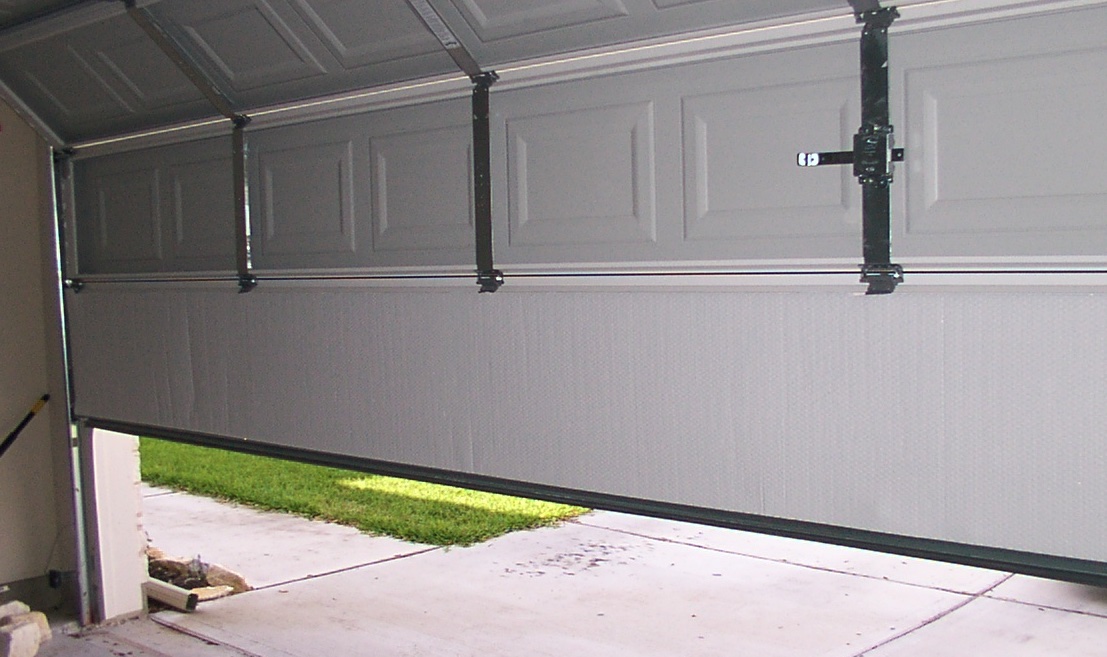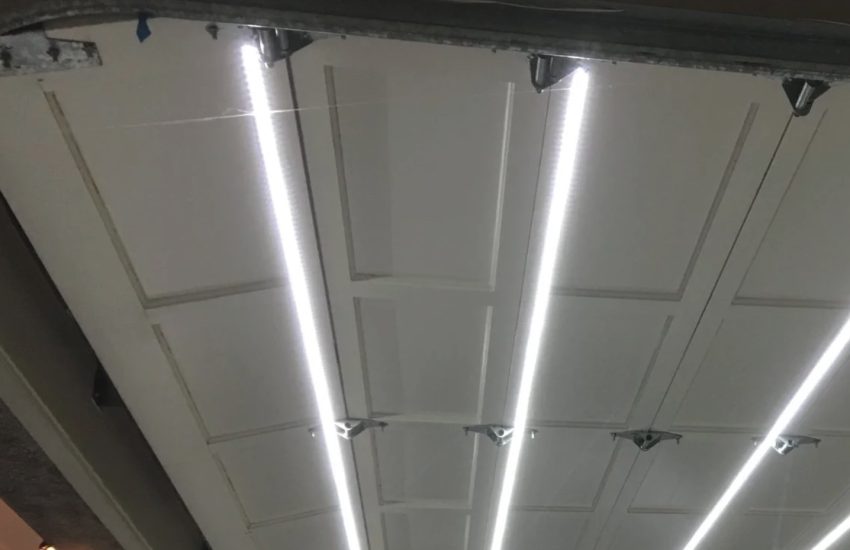Do Insulated Garage Doors Really Make a Difference?
Did you know you can insulate your garage door to keep heat out? Insulation such as fiberglass is not only fire-retardant, it also helps regulate the temperature in your garage.
Determining whether to insulate your garage doors or buy an insulated garage door is a huge decision. Not only is it beneficial when it comes to heat and cold regulation, it also makes your garage door sturdier. Keep reading to learn more about insulated garage doors.
Is it Worth Getting an Insulated Garage Door?
Yes. The absolute core benefit of an insulated garage door is its energy efficiency. When winter comes, having an insulated garage door will help you keep your whole house warm.
An insulated garage door is the best long-term investment. Though insulated garage doors are more expensive than non-insulated, the garage’s energy savings and year-round usability allow the insulated door to pay for itself. Also, insulated garage doors are extremely robust.
Should I insulate my garage door?
It depends on several factors. The reasons below should help you decide between insulated and non-insulated garage doors;
You should get an insulated garage door if;
You have an attached garage
Insulation is particularly important for homes with attached garages since your garage shares at least one wall with the rest of your house. A poorly-insulated garage door will allow hot/cold outside air into your garage and your home; in turn, you’ll spend a lot more money on heating and cooling costs. You might also want to consider an insulated door if your garage shares a wall with a bedroom, as it will be significantly quieter.
You use your garage for more than car parking
If you keep pets in your garage or use them as a workspace for hobbies, an insulated garage door will help maintain a safe and comfortable inside temperature. Personality belongings, particularly your cars, will also benefit from being stored in a more stable environment. Extreme temperature differences will affect your car’s fluids, battery life, tire pressure, etc.
You wish to increase your home’s value.
If you plan to put your house on the market eventually, investing in an insulated garage door is smart. Insulation helps to increase home value by reducing annual energy costs, maximizing garage usability, and boosting your overall curb appeal.
You should get a non-insulated garage door if;
Your garage is detached
If you have a detached garage, you’re probably not too concerned about the temperature inside your garage. But, likewise, outside temperatures and noise will not be able to creep into your home from your garage.
You live in a warm climate
You could also bypass the expense of an insulated garage door if you live in an area with a mild year-round climate, as outside elements will not significantly impact indoor temperatures.
You only use your garage for car parking
Another factor to consider is how often you operate your garage door throughout the day and if you tend to leave it open for extended periods. Each time the garage door opens, your home’s thermal envelope is broken – insulation will not serve much value to you if your garage door is constantly being operated or kept open for a long time.
Pros and cons of insulated garage doors
Below are some pros and cons of garage door insulation;
Pros
Reduced Energy Costs
Insulation is often advertised to reduce energy costs. The actual results vary from home to home, but an insulated garage door can make your home cooler in summer and warmer in winter without increasing the demand for your HVAC system.
This is especially true where there are more extreme temperature variations. If your garage is attached, the difference is even greater because cold air can seep right through the door into the garage and adjacent rooms. And if you have insulated walls, installing an insulated door can reduce heat loss by 70%.
Warmer Garage Space
Living in a cold climate can bring indoor air above freezing, so you avoid dead car batteries and frozen pipes or problems storing items such as oil, paint, or food. You can also use a warmer garage as a workspace, a family room, a playroom, or enjoy hobbies.
An insulated garage door can raise the interior temperature by 20°F or more relative to the outside temperature. This difference varies depending on the R-value of the material.
Greater Durability
Uninsulated, single-layer doors are weaker and hold up poorly to impacts. However, a steel or aluminum frame can support insulated garage doors filled with solid-core insulation sandwiched between panels.
This lightweight design is more resistant to denting and other damage. In addition, insulated, multi-layered doors are resistant to weather-related factors, such as wind, hail, and projectiles. At the same time, sensitive internal mechanisms are protected against cold air and extreme temperature changes.
Insulation adds a thick inner layer to your garage door, giving it more impact resistance. In addition, the foam can absorb the shock from daily openings and impacts, making the door less likely to dent.
Besides the added durability, insulation also protects the garage door opener. So in a warmer garage, the motor and metal moving parts will stay in better condition and last longer.
Noise Reduction
Another advantage of insulation is it dampens noise—by as much as 16 decibels. It can help block noise from the door’s movement and its opener. The biggest difference is if you have an older door with loose chains, worn rollers, and poorly lubricated hinges.
Thanks to its tighter construction and heavier weight, a newer door will vibrate less. In addition, the insulation will also block noise from outside, so you hear less traffic, people, and construction sounds from beyond your walls.
Curb Appeal
If a buyer knows the garage door is insulated, that’s enough to dig deep into other potential reasons to buy a house. An insulated door also looks good. It can be customized in various styles and with different materials and colors.
You can choose different panels and textures, while insulated windows can be added.
Better protection for your vehicle and belongings
An insulated garage door protects your vehicle from extreme temperatures. Cold weather limits your battery’s capacity and could leave you with a dead battery. It also thickens fluids like antifreeze and motor oil, which could cause malfunctions.
Cold air can also reduce your tire pressure. These issues could shorten your vehicle’s life or send you to a mechanic. Besides your vehicle, you more than likely store lots of temperature-sensitive materials in your garage.
Things like motor oil, paint, fertilizers, and cleaning chemicals can change consistency in extreme temperatures. Damage to your vehicle and other belongings is less of a concern in a warmer garage due to having an insulated garage door versus a non-insulated door.
They Offer Flexible Insulation Options
When you pick an insulated garage door, you can select the garage insulation R-value to meet your needs and budget. R-value is a measure of a material’s resistance to heat flow. A high R-value creates better insulation, keeping heat indoors and the cold outdoors. It works the other way around in the summer, keeping your air conditioning inside.
Garage door insulation comes in many R-values, allowing you to select moderate or excellent insulation. The average R-value for a garage door is R‑10. a garage door with an R‑16 value will help keep your home protected from heat and humidity during the summer months. That helps you cut down on your cooling costs.
Cuts Down on Moisture
Insulation helps trap heat in, but it helps keep moisture out. Uninsulated garages are very prone to moisture problems. Adding insulation can help you protect the items you have stored in your garage.
All of those things stored in the garage can be ruined by moisture. Condensation on metal can lead to rust. And I don’t think I need to warn you about the dangers of moisture and electronics. Clothes and decorations can easily mold and mildew if they get damp.
Allows You to Have Extra Space
All of the benefits we have mentioned mean that an insulated garage becomes a much more comfortable, usable space. For example, you can use that extra space for a workshop or keep your exercise equipment there with an insulated garage.
Helps Prevent Insects Infestation
When you insulate your garage, you seal up any drafts or holes where air may be escaping. But the air isn’t the only thing that passes through those drafty areas. Bugs can get through as well.
Insulating your garage makes it more difficult for insects to enter. That helps cut down on bugs that can get into your home. Which is super amazing because who wants to have to call the exterminator?
Helps With Fireproofing
Rigid foam can be a great option for garage insulation. In addition, most commercial insulation has some fire-retardant properties. So, by insulating your garage, you can add an extra level of protection for you and your family.
Cons
These are the main demerits of insulated garage doors;
They are costly
The main downside to insulated garage doors is their cost. Even the most economically priced insulated garage door will cost more than a similar uninsulated model. It’s crucial to weigh the upfront investment against long-term energy savings. You could save money down the line through a lower energy bill and a slight boost to your home’s resale value.
No Benefit You If The Garage Door Is Always Open
An open insulated garage door is no different from an uninsulated one. Upgrading to an automatic opener with myQ connectivity is a fantastic way to eliminate this drawback. The myQ app turns your automatic opener into a smart device. You’ll receive alerts when you’ve left your door open and can shut the door from your phone, no matter where you are.
It Can Make Your Garage Too Hot
When we talked about the positives of insulation, we talked about its ability to trap heat, which is amazing if you live somewhere with a cold climate. But unfortunately, it can also trap heat in hot climates as well. And if your garage is insulated, the heat will stay there. So, if you live in a hot climate, your might find an insulated garage is hotter than you can handle.
It Can Be Ugly if Not Finished
The last downside to insulation is more cosmetic than anything else, but it is worth mentioning. Bare insulation can be ugly. If you insulate your garage and want it to look nice because you use it more frequently, you have the added drywall cost to finish it off.
Does insulating a garage door make it too heavy?
No. Most types of insulation are lightweight, and an insulated garage door should not be appreciably heavier than an uninsulated one. In addition, insulation should not affect the ability of a garage door opener to open and close the door.
What does an insulated garage door look like?
It is easy to determine if your garage door is insulated. First, take a look at the inside of the door, and if you see what looks like a blanket of white Styrofoam between the silver bars to the hinges attached, you have an insulated door.
Another way to determine if your garage door is insulated is if you can see the panel design from inside and outside the garage, the door is not insulated. If there were insulation, you would only be able to see the panel design from the outside.


